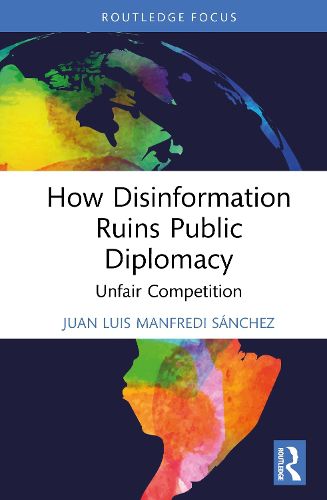Readings Newsletter
Become a Readings Member to make your shopping experience even easier.
Sign in or sign up for free!
You’re not far away from qualifying for FREE standard shipping within Australia
You’ve qualified for FREE standard shipping within Australia
The cart is loading…






How Disinformation Ruins Public Diplomacy evaluates and analyzes how Chinese and Russian public diplomacy strategies differ from the existing academic literature and debates, specifically in the context of the new disinformation era.
In the context of mediatised public diplomacy, disinformation, and deglobalization, the book asks: do China, Russia and new emerging powers take advantage by employing values and techniques attributed to public diplomacy? What if goals (dialogue and cooperation) are settled on an unfair basis (false content, meddling, and institutional erosion)? Can their repertoire of actions be considered public diplomacy? And if their initiatives are not public diplomacy, what impact do their actions have on the theoretical construction of the discipline? While using China and Russia as the two main case studies in order to develop a new theory, the book covers other relevant cases on the management of public diplomacy for other purposes. The case of Turkey provides a model of transformation and adaptation of public diplomacy, with Erdogan's hyper-leadership built on anti-Western rhetoric and the emergence of a new Ottomanism. The case of India explores Modi's creation of an ethnically-branded democracy which places Hinduism at the heart of political decisions. In the case of Morocco, its positioning in religious dialogue, the establishment of relations and political normalization with Israel, and territorial unity (Western Sahara) are explored.
Exploring how authoritarian powers abuse the global disinformation order to achieve their public diplomacy goals, this book will be of great interest to students and scholars of international relations, politics, public diplomacy, communication studies, and social theory. In the professional sphere it will also appeal to politicians, diplomats, foreign policy makers, think-tanks, journalists, and foreign correspondents.
$9.00 standard shipping within Australia
FREE standard shipping within Australia for orders over $100.00
Express & International shipping calculated at checkout
How Disinformation Ruins Public Diplomacy evaluates and analyzes how Chinese and Russian public diplomacy strategies differ from the existing academic literature and debates, specifically in the context of the new disinformation era.
In the context of mediatised public diplomacy, disinformation, and deglobalization, the book asks: do China, Russia and new emerging powers take advantage by employing values and techniques attributed to public diplomacy? What if goals (dialogue and cooperation) are settled on an unfair basis (false content, meddling, and institutional erosion)? Can their repertoire of actions be considered public diplomacy? And if their initiatives are not public diplomacy, what impact do their actions have on the theoretical construction of the discipline? While using China and Russia as the two main case studies in order to develop a new theory, the book covers other relevant cases on the management of public diplomacy for other purposes. The case of Turkey provides a model of transformation and adaptation of public diplomacy, with Erdogan's hyper-leadership built on anti-Western rhetoric and the emergence of a new Ottomanism. The case of India explores Modi's creation of an ethnically-branded democracy which places Hinduism at the heart of political decisions. In the case of Morocco, its positioning in religious dialogue, the establishment of relations and political normalization with Israel, and territorial unity (Western Sahara) are explored.
Exploring how authoritarian powers abuse the global disinformation order to achieve their public diplomacy goals, this book will be of great interest to students and scholars of international relations, politics, public diplomacy, communication studies, and social theory. In the professional sphere it will also appeal to politicians, diplomats, foreign policy makers, think-tanks, journalists, and foreign correspondents.